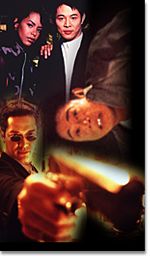By Martha Burr
 Jet Li has never shied away from complexity.
Jet Li has never shied away from complexity.
In fact, he has embraced it, and many of his Hong Kong movie roles, from Wong Fei Hung to Ching Woo's Chen Zhen to the mysterious hero of the Black Mask, have been conflicted ones, searching for right and wrong, purpose, justice, and at times existential meaning. In Romeo Must Die, Li once again plays the hero who must face the challenges of revenge, loyalty and this time, love.
Ironically, Li was introduced to American audiences as the villain in Lethal Weapon 4, and was arguably the best thing about that film. His role as bad guy startled not a few longtime fans, but most of us gleefully watched him eat up his performance. It also did not fail to impress Hollywood. Joel Silver, hot off of producing The Matrix, chose Li for his next action opus.
The seedy waterfront of Oakland, California is the setting for Romeo Must Die's explosive gang war between Asian and African American gangs. Kungfu action and the hip hop beat connect when Han Sing (Li) meets Trish O'Day (Aaliyah) and they join forces to stop the killings that have lost them each a brother. Updating Romeo and Juliet to an urban hip hop scene and adding kungfu into the mix definitely puts a new spin on an old story. The characters are compelling, the music infectious, and the kungfu is - of course - dazzling.
We sat down with Li as he gave us the lowdown on Romeo Must Die.
The Interview
While many stars let their egos do the interviews, Jet Li in person is gracious, thoughtful and earnest, weighing questions with seriousness and interest. His English is now excellent, and his sense of humor oftentimes sly.
We asked him about his latest film character. "The basic story is a Romeo and Juliet story, where one is a black family and one is a Chinese family. They are also mafia families. My father is the bad guy. When I was young my mother died, and I promised to take care of my younger brother. Later on my character, Han Sing, is a policeman, but my my brother gets into trouble, so I have to help him, and I go to jail. Later on I find out who has killed my brother. Then I have to go to America, and I meet Aaliyah. She also lost her brother. So we work together to find out what's going on."
On Acting
Of all the martial arts stars to come out of Hong Kong, Li is perhaps the one with the most depth, capable of subtle and nuanced performances. This is evidenced in the jail scene in the film when Li first learns about his brother's death. Li says:
"I did a lot of homework for this character. How does he feel about his father, about his mother. He would never show off like his younger brother. But what is in his mind, when he hears about his brother's death?"
When asked about his method for acting, Li breaks into a broad smile and says, offhandedly, "I don't know what I'm doing! In the States now we have a lot of time to concentrate on the acting. But in China and Hong Kong we didn't have a lot of time to do the rehearsal, especially on my first film, Shaolin Temple. I was sixteen then. I never learned acting. The director just told me what to do, to act how you feel, just act. My character was a novice monk, and then his father died. He was angry, he wanted to fight the bad guy.
"Later on I found that life is the best teacher, because I meet different characters, and have different experiences. Just being in school - acting or wushu - you don't meet real people. A lot of things you don't learn, but it's your imagination, and what you think about. We play many characters, but we cannot be many characters in real life. In real life I'm just Jet Li. But in real life you learn different things that you remember, and that help you build a character.
"From the beginning I learned martial arts, and from that I became an actor. I had to learn a lot about acting. In Chinese there's a saying that doesn't translate very well, that life is the acting, acting is the life.
"I never kill people in the real life! But in the movies, I need to kill someone, so you have to prepare, you have to think, to express how to do that. Even though I've never hurt people on the street, in the movies I hurt people a lot. I still want to learn more about acting. I need to improve a lot. There will always be many different characters to portray."
Team Jet
Li has produced more than half a dozen movies in Hong Kong, and Hollywood pampering hasn't left him sitting in his trailer here. Doing some "ghost producing" of his own on Romeo Must Die, Li had major input on everything from the stunts to the sound stage.
"I learned a lot in Romeo Must Die. On my first American film, Lethal Weapon 4, they had a big budget. I had a schedule, and I showed up. When I said I needed more people, more time, they said fine. Anything I needed, they gave me. In this movie, I told them I needed this, this and this, and they said, we only have that much money, that much time, and we need to do that, that, and that.
"So we needed to change a lot. Also we got a lot of pressure from the producer, from the director, from the schedule, from the weather. Some of the actors needed to be trained. It took a lot more time. This time I'm not just the actor, going to the set to perform. Behind the scenes I had a lot of things to do. I had to work much harder this time. I did a lot of homework. Even Saturday and Sunday I would go to the set to try and decide how to build the stage. How to stage the fights. We worked with fire, did wire work, car chases. We needed to figure out how to use the fire hose without people getting hurt. A lot of people who worked on this movie called it Team Jet. One thing that helped was that we had the same Hong Kong and American action crews from Lethal Weapon 4.
Fight Scenes
Romeo Must Die has eight essential fight scenes which propel the dynamic action of the movie, and Li's challenge was to make them all different, to create a variety of texture, and most of all, to be creative.
Li's opening scene is his breakout from a Hong Kong jail, where his amazing upside down stunts in the jail interrogation room left audiences cheering. Li laughs recalling having to shoot from upside down.
"The interrogation room was the hardest scene. I've seen a lot of movies, American and Hong Kong, with interrogation scenes. They always just beat them up. How do you make it different? Well, we thought that hanging upside down would be different. I got together with all my crew, Corey (action choreographer), and the stuntmen, and we discussed how to make it different. It was harder to create the movements for that stunt because your focus is totally lost - you look left, you look right, it's confusing to the eye! Shooting it took five days.
"People ask me if I've changed my style, and essentially I haven't. It's still Jet Li style. But each movie has its own character, not only the physical movement, but something inside for the character. In this movie we have 8 different kinds of fight scenes. In each different situation, we need to fight differently, and use a different kind of martial arts. If you want to hurt people, if you want to stop people, if you want to kill people (laughs) - it's a different fight."
On Hong Kong and Hollywood
One of the most frequent questions asked of all the Hong Kong actors and directors in America is how they adapt to the difference between moviemaking styles, production cultures and timeframes. Where Hollywood may allow more time for acting rehearsals, it still perhaps hasn't caught on to how much goes into really good martial arts scenes. Li concurs.
"The budget is much bigger here. In Hong Kong we use action a lot, so we know each film has a lot of action scenes. We know we have to put a lot of time in the action scenes. In Hong Kong it's normal to shoot an action scene for 7 days, and take 10 days for the ending. But here, you talk to the American producer and tell them you need that, and they say, 'Are you crazy? That's a lot of money!'
"So sometimes you need to figure out how to work. In shooting martial arts, you can't just shoot from beginning to end. You need to show the power, show the whole movement, you need to see the details. If the shot's too wide, you can't see everything, you need a close up for detailed things.
"I worked with Corey Yuen doing the action for Romeo Must Die. He's a good action director and we worked together on Lethal Weapon 4, so I don't need to explain to the producer and Warner Bros. that this guy is a very famous guy. They already knew.
Yuen Woo Ping, who did the action for The Matrix, is also well-known here now. He did a great job. He's also a friend of mine."
On the Kungfu Genre, Yuen Woo Ping, The Matrix
Yuen Woo Ping in fact directed Li in Tai Chi Master, and did the brilliant choreography for him in Once Upon a Time in China and Fist of Legend. Many Hong Kong movie fans are eager to see if the two will come together on American soil in what seems like a natural collaboration, now that both have made the leap West. Li comments:
"We always get together and discuss some future projects. I talk with Woo Ping and Corey about moving the genre forward. Hong Kong action movies already have a history of more than 30 years, from old style, to Bruce Lee, to Jackie Chan, Sammo Hung. Maybe more than a thousand movies, with movements that are similar.
You look at the drama story, the love story, we see the same thing many times. Even in martial arts films, the basic things are no different, and still the movement is the movement. But if you see a different angle, you say, oh, I never thought of that before, like in The Matrix.
I think we can do better, because Keanu Reeves never did martial arts before! And he was pretty good! He never had professional training, so especially considering this he did a very good job. You're in the theater, and all the audience goes, Wow! I tell you, that's the million dollar shot. The movement is simple. But the angle is different. The lights, the clothes, everything put together, you go, oh, that's a new thing.
"The question is, how do you find this new thing? You need to work fast, and find a new movement every day, because the audience catches on very quickly. The first time a move can be very exciting, but next time, boring. So we always need to think about what's new. A different angle. We need to push.
"You also need to find interesting stories, and that's very hard to find. Usually with the action story the good guy is a policeman, or the FBI, and then it's kill, kill, kill. I would try something different. Even in the beginning with The Matrix, they took a long time to sell the story. That was work. Creating something is very hard. Just to follow the old story is very easy."
On Philosophy
Intelligence is one of the qualities that makes Li most watchable on screen. It shines through when he speaks as well, when we asked him about his personal philosophy.
"Nothing is 100% wrong, nothing is 100% right. Only the percentage, a different angle, makes you see different things. Like with the world, in the beginning there is nothing.
Then we have a ball, and now we have the sky, we know the ground, with the yin and yang. It becomes East and West, times two, and so on. Now we have taiji, and taiji is yin and yang.
"Lots of things, in my opinion, have both sides. And you have to listen to them. I train every day. I run, I train in qigong, and taiji. With qigong you use the inside to train your body and your mind.
"I don't think I have a lot of planning in my life, I just look at the martial art. Like the taiji - go with the flow. We never know what happens tomorrow. When I have a job to do I focus all my attention on it, do your best. Don't think about things too far in advance.
"When I first visited the United States I was eleven years old and we performed for President Nixon on the White House Lawn. We went to San Francisco, New York, Washington. There were lots of policemen, lots of reporters, lots of bodyguards. And lots of food!
"I thought many things were interesting in America, and totally different than what I'd been told. This is why when I was young I began to think about both ways. Like in learning taiji, always send yang to see yin, and what happens. Sometimes we need to send the yin to look at yang. That can solve a lot of thinking, and help you.
This also helps me when I grow up. I always say America has a lot of good things, and it also has a lot of trouble. China has a lot of good things, and has a lot of trouble too. So it depends. Different countries, different people have a different situation. This I learned from my first time in the States, and from then on I started to think more and more about it that way.
The Here and Now
It's no understatement to say that Jet Li works hard, but his work is driven by his quest for knowledge, his curiosity, and his desire to make a difference.
He says:
"For my movies, I try to talk to people, to see what they like. I need to learn a lot. This is a different culture, a different age. Even in Hong Kong, now I'm 36. But in the States, if you want to learn the movie business, you need to learn a lot. A year ago we started a website. I want to ask my fans a lot of questions. What do they want to see?
"With the physical body, I think in a few years you can learn a lot, but deep inside, how you think, how your heart is, it's so hard. One punch is very easy, but the power from inside is very difficult.
"We know there is trouble in the world, but how do you know what is the best to do to help people? We want to tell stories that give people things they really need to know. We don't want just an action movie that only tells you how to fight, and hurt people. We need to learn. Behind the physical body you can learn a lot of things. Maybe East-West culture things. We especially need to help young people, so they don't make so many mistakes, to tell them the correct way to go.
"This is why I want to design some video games, television, movies, that go beyond just physical things, and interpret more serious philosophy. I'm working on developing a game now. In too many video games they just fight, fight fight. After people play these a few years, what are their thoughts? Just to fight. They never learned new things. We need to give the games character. And real characters. You need to help people to reason. If someone is not 100% bad, you cannot just kill them. Maybe you can beat them up, but help them. Look at Wong Fei Hung!
"You need to tell younger people, play the games, but at the same time, learn something new, learn some philosophy. Sometimes you lose, you win. Sometimes you win, you lose. The young kids they don't know that. They just go bang, bang, bang, kick, kick, kick. So we need to tell them."?
Click here for Feature Articles from this issue and others published in
2000 .
Written by Martha Burr for KUNGFUMAGAZINE.COM
![]() Print Friendly Version of This Article
Print Friendly Version of This Article















